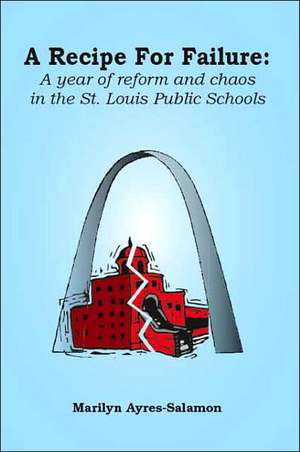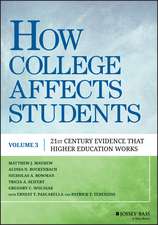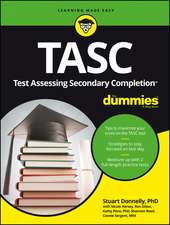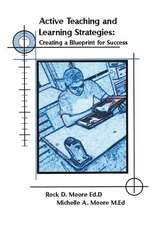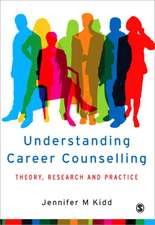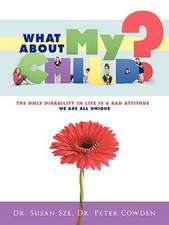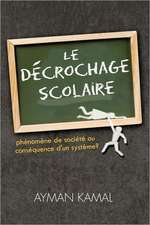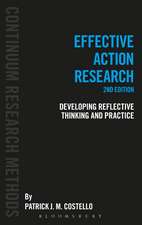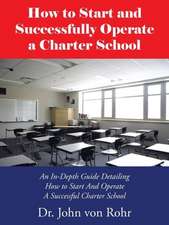A Recipe for Failure
Autor Marilyn Ayres-Salamonen Limba Engleză Paperback – 31 mai 2006
Suddenly, the "aha" moment arrived. These poor souls didn't leave simply because they were poor. With no money, no reliable transportation, no idea of where they would stay if they left their homes, they were stuck.
The one positive outcome of Katrina's wrath could be that our nation and our leaders engage in a discussion on the culture of poverty, a subject that has not been seriously addressed for at least a decade. As a society, we need to attain some understanding of the reality faced on a daily basis by those living in generational poverty.
This book is illustrates the day-to-day reality of teaching in an urban school district under conditions that would not be tolerated in any other school district in the St. Louis metro area. Many studies have been published on the challenges of urban education, and many books have been written about the causes of the achievement gap between socio-economic levels, and between racial groups. These works, while informative, do not give any actual description of the conditions under which urban teachers are expected to teach, and students are expected to learn.
Additionally, the comment that "Schools should be run asbusinesses are run," is a recurrent theme from non-educators. The St. Louis Public Schools contracted with a business turnaround team to take control of the district for one year and "streamline" operations. The impact of this turnaround team was not positive.
On both the federal and state level, through the No Child Left Behind Act and the Missouri Department of Elementary and Secondary Education's accreditation requirements, a more rigorous set of requirements and accountability has placed additional pressure on school districts. This is not a bad thing; to the contrary, I feel that the goals are ones that most teachers share. Unfortunately, educational funding has decreased, making compliance a challenge. These are issues that every school district faces.
Urban school districts face additional challenges. During my brief tenure in the St. Louis Public Schools as an eighth grade teacher, I found all of the social challenges I had dealt with in a suburban school district pronounced exponentially, and administrative support systems seriously lacking. The business turnaround firm hired to straighten out the financial quagmire that the district was in simply increased the problems.
In all too many cases, students were from single-parent homes or foster homes, or were homeless. Many had parents who were either absent, or were negative role models. The culture of poverty in which they lived caused instability and an absence of long-term goals.
The administrative staff in the Central Office was not supportive of building administrators or teachers. Discipline alternatives, such as an In-School Suspension (ISS) program, were not available. One of the first actions of theturnaround team was to close two alternative schools, leaving nowhere to place students who needed intervention and counseling, in addition to education. Suspensions were not enforced by Central Office. Social workers were understaffed and overloaded to a dramatic degree.
There was little academic accountability. Too many classes were taught by substitutes not qualified to teach the subject matter. There was a lack of cohesion in terms of academic programs. Students were not held accountable academically, with too many being passed on despite a lack of skill development. Many of my eighth-graders had math and reading skills at the second or third grade level.
Basic teaching supplies such as textbooks, copying supplies, dictionaries were insufficient, and delivery of them uncertain. Funding that should have gone to after school programs and teaching supplies was frozen by the district administration.
Special education services, mandated by federal law, were totally out of compliance, and the majority of Special Education teachers were either not certified, or on provisional certification. As a result of cost-cutting efforts by the turnaround team, many classrooms did not have aides.All too many of the faculty were burned out, and concentrated on just "getting through the day." Several in my building said, "I don't care about the kids. I just need the job." Morale was lower than I'd ever seen.
In this book, I've tried to provide the reader with an account of my experiences, to bridge the gap between the abstract to a more concrete understanding of the needs and challenges of urban education. I've also attempted to illustrate the impact that School Board and administrativedecisions can have--both positively and negatively--on students and teachers. Many people don't understand that public education is not, and cannot be, viewed in a purely business perspective.
The management team of Alvarez & Marsal, headed by William Roberti, made many decisions without regard to the enormous needs of the students and the community. Rather than being attentive to the support systems that were necessary for teachers to teach and students to learn, these systems were decimated. An educational system addressing students from generational poverty cannot be run in the same way as Brooks Brothers.
Preț: 113.53 lei
Nou
Puncte Express: 170
Preț estimativ în valută:
21.73€ • 23.61$ • 18.27£
21.73€ • 23.61$ • 18.27£
Carte disponibilă
Livrare economică 01-15 aprilie
Preluare comenzi: 021 569.72.76
Specificații
ISBN-13: 9781412076937
ISBN-10: 1412076935
Pagini: 176
Dimensiuni: 152 x 229 x 11 mm
Greutate: 0.28 kg
Editura: Troubador Publishing
Locul publicării:Canada
ISBN-10: 1412076935
Pagini: 176
Dimensiuni: 152 x 229 x 11 mm
Greutate: 0.28 kg
Editura: Troubador Publishing
Locul publicării:Canada
Notă biografică
Marilyn Ayres-Salamon received both her B.S. in Political Science and M.A. in Education from Lindenwood College, and her Master Journalism Education from the Journalism Educators Association. She has Missouri Teaching Certification in Math, English, Social Studies, Journalism, and Reading Specialist, and has received numerous honors and awards in teaching excellence. A professional educator since 1984, she has served as a middle school teacher, university adjunct instructor in the School of Education, and instructor in an alternative school.
